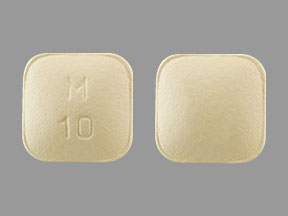
Montelukast Coupons & Savings Card – Discount Prices from $4.54
Generic for: Singulair
Montelukast, also known by the brand name Singulair, is an oral medication primarily used to manage and prevent asthma symptoms such as wheezing and shortness of breath. It is also effective in preventing breathing difficulties during exercise, known as exercise-induced bronchospasm. In addition, Montelukast is used to alleviate symptoms of hay fever and allergic rhinitis, including sneezing and a runny or itchy nose. However, for allergic conditions, it should be considered only when other medications are ineffective or unsuitable.
Montelukast works by blocking leukotrienes, natural substances in the body that can cause inflammation and swelling, which contribute to asthma and allergy symptoms. This action helps to reduce airway inflammation, making breathing easier.
It is important to take Montelukast regularly for it to be effective, as it is not designed to relieve sudden asthma attacks or acute breathing problems. In such cases, a quick-relief inhaler should be used as prescribed. Montelukast is generally used as an additional treatment when asthma symptoms are difficult to manage with other medications. Always consult with a healthcare professional before starting any new medication.
Our coupons are free to use. Before paying, show the pharmacist your Montelukast savings card to get your free discount. Use our filters below to edit the prescription box to match your needs. The Montelukast prices will update based on your prescription needs. Above our Montelukast coupons, you can change your location to see pharmacy prices and costs in other areas. We're here to help you buy Montelukast at the lowest price with our prescription discount card.
My prescription
Edit
10MG, Montelukast (30 Tablets)
Select pharmacy

CVS
$19.17
COUPON PRICE
Walmart
$4.54
COUPON PRICE
Walgreens
$10.44
COUPON PRICE
Albertsons
$11.53
COUPON PRICEMontelukast savings card
Show this card to your pharmacist
Walmart
$4.54
BIN
ID
PCN
GRP
019876
LH95E68EA0
CHIPPO
LHX
Powered by
Montelukast, also known by the brand name Singulair, is an oral medication primarily used to manage and prevent asthma symptoms such as wheezing and shortness of breath. It is also effective in preventing breathing difficulties during exercise, known as exercise-induced bronchospasm. In addition, Montelukast is used to alleviate symptoms of hay fever and allergic rhinitis, including sneezing and a runny or itchy nose. However, for allergic conditions, it should be considered only when other medications are ineffective or unsuitable.
Montelukast works by blocking leukotrienes, natural substances in the body that can cause inflammation and swelling, which contribute to asthma and allergy symptoms. This action helps to reduce airway inflammation, making breathing easier.
It is important to take Montelukast regularly for it to be effective, as it is not designed to relieve sudden asthma attacks or acute breathing problems. In such cases, a quick-relief inhaler should be used as prescribed. Montelukast is generally used as an additional treatment when asthma symptoms are difficult to manage with other medications. Always consult with a healthcare professional before starting any new medication.
Our coupons are free to use. Before paying, show the pharmacist your Montelukast savings card to get your free discount. Use our filters below to edit the prescription box to match your needs. The Montelukast prices will update based on your prescription needs. Above our Montelukast coupons, you can change your location to see pharmacy prices and costs in other areas. We're here to help you buy Montelukast at the lowest price with our prescription discount card.
More prescriptions for asthma
coupons from$5.12Save 76%
coupons from$4886.12Save 72%
coupons from$51.84Save 90%
coupons from$20.61Save 70%
coupons from$42.64Save 91%
coupons from$51.84Save 90%
coupons from$30.71Save 75%
coupons from$5.32Save 78%
More prescriptions for asthma
Rayos Save 76%coupons from $5.12
Tezspire Save 72%coupons from $4886.12
Xopenex Hfa Save 90%coupons from $51.84
Nasacort Allergy 24hr Save 70%coupons from $20.61
Terbutaline Save 91%coupons from $42.64
Xopenex Hfa Save 90%coupons from $51.84
Accolate Save 75%coupons from $30.71
Methylprednisolone Save 78%coupons from $5.32
Montelukast dosage forms
Use our Montelukast 10MG coupon with prices from $4.54 for 30 Tablets. You can also use our Montelukast 10MG coupon with prices from $3.18 for 10 Tablets. We have a Montelukast 10MG coupon with prices from $3.45 for 14 Tablets. You can use our Montelukast 10MG coupon with prices from $3.52 for 15 Tablets.
Dosage Quantity Price from Per unit 10MG 30 Tablets $4.54 $0.15 10MG 10 Tablets $3.18 $0.32 10MG 14 Tablets $3.45 $0.25 10MG 15 Tablets $3.52 $0.23 10MG 60 Tablets $6.57 $0.11 10MG 90 Tablets $15.11 $0.17
| Dosage | Quantity | Price from | Per unit |
|---|---|---|---|
| 10MG | 30 Tablets | $4.54 | $0.15 |
| 10MG | 10 Tablets | $3.18 | $0.32 |
| 10MG | 14 Tablets | $3.45 | $0.25 |
| 10MG | 15 Tablets | $3.52 | $0.23 |
| 10MG | 60 Tablets | $6.57 | $0.11 |
| 10MG | 90 Tablets | $15.11 | $0.17 |
